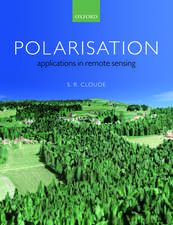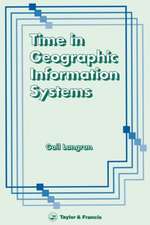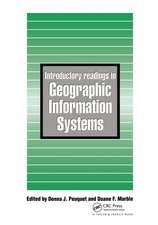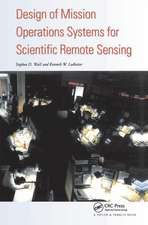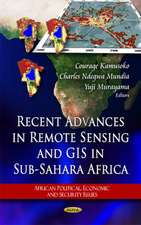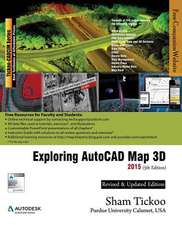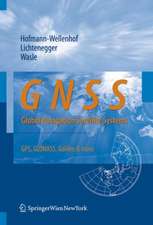Ground Truth: The Social Implications of Geographic Information Systems: Mappings: Society/Theory/Space
Editat de John Picklesen Limba Engleză Paperback – 28 feb 1995
Over the past two decades, techniques for advanced computing and enhanced imaging have transformed the ways planners, geographers, surveyors, and others think about and visualize the places, regions, and peoples of the earth. Ground Truth is the first book to explicitly address the role of geographic information systems (GIS) in their social context. Contributing authors consider the ideas and practices that have emerged among GIS users, demonstrating how they reflect the material and political interests of certain groups. Chapters also discuss the impact of new GIS technologies on the discipline of geography, and evaluate the role of GIS within the wider transformations of free-market capitalism.
Preț: 291.67 lei
Nou
Puncte Express: 438
Preț estimativ în valută:
55.81€ • 58.43$ • 46.18£
55.81€ • 58.43$ • 46.18£
Carte tipărită la comandă
Livrare economică 05-19 aprilie
Preluare comenzi: 021 569.72.76
Specificații
ISBN-13: 9780898622959
ISBN-10: 0898622956
Pagini: 248
Dimensiuni: 152 x 229 x 18 mm
Greutate: 0.43 kg
Ediția:New.
Editura: Guilford Publications
Colecția Guilford Press
Seria Mappings: Society/Theory/Space
ISBN-10: 0898622956
Pagini: 248
Dimensiuni: 152 x 229 x 18 mm
Greutate: 0.43 kg
Ediția:New.
Editura: Guilford Publications
Colecția Guilford Press
Seria Mappings: Society/Theory/Space
Public țintă
Professional Practice & Development and UndergraduateCuprins
J. Pickles, Representations in an Electronic Age: Geography, GIS and Democracy. M.F. Goodchild, GIS and Geographic Research. P.J. Taylor, R.J. Johnston, GIS and Geography. M.R. Curry, Geographic Information Systems and the Inevitability of Ethical Inconsistency. H. Veregin, Computer Innovation and Adoption in Geography: A Critique of Conventional Technological Models. P.H. McHaffe, Manufacturing Metaphors: Public Cartography, the Market and Democracy. J. Goss, Marketing the New Marketing: The Strategic Discourse of Geodemographic Information Systems. S.M. Roberts, R. H. Schein, Earth Shattering: Global Imagery and GIS. T.M. Harris, et al, Pursuing Social Goals Through Participatory GIS? Redressing South Africa's Historical Political Ecology. J. Pickles, Conclusion: Towards an Economy of Electronic Representation and the Virtual Sign.
Notă biografică
John Pickles, an Associate Professor in the Department of Geography, is also member of the Committee on Social Theory at the University of Kentucky. His teaching and writing focus on such topics as social theory, disciplinary history, regional political economy, and the geography of transition and restructuring in South Africa and Eastern Europe.
Recenzii
I recommend it highly for GIS users and instructors....Planners' use of GIS would be richer and wiser if those who used and taught the technology paid attention to the important lessons contained in this book. --Richard E. Klosterman in APA Journal
There is a great deal of substance for important and engaging debate...GIS is an extremely important medium that has had relatively little attention paid to its message. This book advances the search for the essence of that message... --Prof. Tom Meredith, Association of Canadian Map Libraries and Archives
... the contributions of many of the chapters in Ground Truth offer intellectually insightful work that will help connect the work of social theorists with the GIS research community. --Francis Harvey, University of Washington, Professional Geographer
Ground Truth provides just the kind of illuminating critique of spatial technologies that has long been needed. In an era of hype about the Information Superhighway it is often difficult to sort out who benefits and who loses in the rush to embrace this dream. Pickles has assembled here a selection of major authors who are familiar with GIS and spatial technologies in order to help us pick a way through these claims. As a result, this book is a well balanced and unflinching look at the societal relations of technology, which will provide many points of departure for upper level or graduate seminars, while deeply informing the work of those of us using GIS and spatial imaging. --Jeremy Crampton, Ph.D., George Mason University
Ground Truth is the first work to deal with one of the most powerful among the new information and imaging technologies: the Geographic Information Systems. By radically modifying our conceptions of earth and space, and our capacity to control them, GIS might bring about profound socioeconomic and cultural restructurings. This courageous collection conveys the real meaning of postmodern geographies, including technology's role in articulating alternative cultural and political projects. --Arturo Escobar, Ph.D., Associate Professor of Anthropology, University of Massachusetts, Amherst
Cyber-empires (old title) is essential reading since for the first time it brings under one cover a series of assessments of the broader impacts of GIS on Geography and society. As such, it signals a new cross-fertilization of the interests of those social theorists in geography who are both fascinated by and concerned with GIS, with those more concerned with its technical problems and possibilities. Containing contributions from both critics and proponents of GIS, and providing a more balanced and nuanced assessment than some of the exchanges in academic journals, its contributions address such concrete topics as the implications of geodemographic marketing; the potential and problems of connecting GIS use with indigenous understandings of land use in South Africa; ethical inconsistencies associated with the use of GIS; the images of GIS promoted by the industry; labor processes underlying map-making with GIS; and GIS as a social technology.
This book holds out promise for a broadening of the research agenda on GIS; from issues of storage, communication, and analysis of data, to questions of GIS as a social technology. Both GIS and geography need each other, for very different reasons, in our instrumental and technical society. The kind of broadening that this book promises can enrich connections between the two. It can provide GIS users with a richer understanding of why use of GIS is not just applied science, but has the potential of transforming how we think about the toward as well as changing the spatiality of society. While GIS reinforces panoptic views of the world, instrumental social practices and positivist scientific methodologies that do not encompass the richness of geography, it also reflects pervasive and influential changes in our society. Geographers must understand and analyze these changes if we are to separate the positive from the undesirable aspects of GIS, and communicate how to make such a separation to the millions who will use GIS for their own purposes--and think they are doing Geography--whether we approve or not. This book begins to raise in a systematic manner the questions that must be asked on the way to such an understanding. --Eric Sheppard, Department of Geography, University of Minnesota
-There is a great deal of substance for important and engaging debate...GIS is an extremely important medium that has had relatively little attention paid to its message. This book advances the search for the essence of that message... --Prof. Tom Meredith, Association of Canadian Map Libraries and Archives
... the contributions of many of the chapters in Ground Truth offer intellectually insightful work that will help connect the work of social theorists with the GIS research community. --Francis Harvey, University of Washington, Professional Geographer
Ground Truth provides just the kind of illuminating critique of spatial technologies that has long been needed. In an era of hype about the Information Superhighway it is often difficult to sort out who benefits and who loses in the rush to embrace this dream. Pickles has assembled here a selection of major authors who are familiar with GIS and spatial technologies in order to help us pick a way through these claims. As a result, this book is a well balanced and unflinching look at the societal relations of technology, which will provide many points of departure for upper level or graduate seminars, while deeply informing the work of those of us using GIS and spatial imaging. --Jeremy Crampton, Ph.D., George Mason University
Ground Truth is the first work to deal with one of the most powerful among the new information and imaging technologies: the Geographic Information Systems. By radically modifying our conceptions of earth and space, and our capacity to control them, GIS might bring about profound socioeconomic and cultural restructurings. This courageous collection conveys the real meaning of postmodern geographies, including technology's role in articulating alternative cultural and political projects. --Arturo Escobar, Ph.D., Associate Professor of Anthropology, University of Massachusetts, Amherst
Cyber-empires (old title) is essential reading since for the first time it brings under one cover a series of assessments of the broader impacts of GIS on Geography and society. As such, it signals a new cross-fertilization of the interests of those social theorists in geography who are both fascinated by and concerned with GIS, with those more concerned with its technical problems and possibilities. Containing contributions from both critics and proponents of GIS, and providing a more balanced and nuanced assessment than some of the exchanges in academic journals, its contributions address such concrete topics as the implications of geodemographic marketing; the potential and problems of connecting GIS use with indigenous understandings of land use in South Africa; ethical inconsistencies associated with the use of GIS; the images of GIS promoted by the industry; labor processes underlying map-making with GIS; and GIS as a social technology.
This book holds out promise for a broadening of the research agenda on GIS; from issues of storage, communication, and analysis of data, to questions of GIS as a social technology. Both GIS and geography need each other, for very different reasons, in our instrumental and technical society. The kind of broadening that this book promises can enrich connections between the two. It can provide GIS users with a richer understanding of why use of GIS is not just applied science, but has the potential of transforming how we think about the toward as well as changing the spatiality of society. While GIS reinforces panoptic views of the world, instrumental social practices and positivist scientific methodologies that do not encompass the richness of geography, it also reflects pervasive and influential changes in our society. Geographers must understand and analyze these changes if we are to separate the positive from the undesirable aspects of GIS, and communicate how to make such a separation to the millions who will use GIS for their own purposes--and think they are doing Geography--whether we approve or not. This book begins to raise in a systematic manner the questions that must be asked on the way to such an understanding. --Eric Sheppard, Department of Geography, University of Minnesota
This book provides the first in depth engagement of GIS with critical social theory. It is a 'must-read', 'must-teach' book.
--Annals of the Association of American Geographers, 12/9/1994ƒƒI recommend it highly for GIS users and instructors....Planners' use of GIS would be richer and wiser if those who used and taught the technology paid attention to the important lessons contained in this book.
--APA Journal, 12/9/1994ƒƒ... the contributions of many of the chapters in Ground Truth offer intellectually insightful work that will help connect the work of social theorists with the GIS research community.
--Professional Geographer, 12/9/1994Descriere
This text addresses the impact GIS is having in our social organization and the ways in which GIS is transforming how we think about the discipline of geography.






